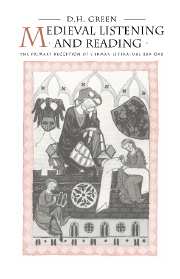Book contents
- Frontmatter
- Contents
- Preface
- List of abbreviations
- PART I Preliminary problems
- PART II Three modes of reception
- PART III Conclusions
- 9 Literacy, history and fiction
- 10 Recital and reading in their historical context
- Appendix Middle High German ‘lesen’ = ‘to narrate, recount, tell’
- Notes
- Bibliographical index
- Index of names
9 - Literacy, history and fiction
Published online by Cambridge University Press: 04 September 2009
- Frontmatter
- Contents
- Preface
- List of abbreviations
- PART I Preliminary problems
- PART II Three modes of reception
- PART III Conclusions
- 9 Literacy, history and fiction
- 10 Recital and reading in their historical context
- Appendix Middle High German ‘lesen’ = ‘to narrate, recount, tell’
- Notes
- Bibliographical index
- Index of names
Summary
Of the three themes in the title of this chapter two have often been linked together. History and fiction could be contrasted with one another by a play on words between res factae and res fictae. The two concepts could also be brought together in medieval theoretical discussion (as treated by Knapp) where historia may be defined as res gesta, but is still differentiated from res ficta. In recent scholarship the same conjunction has been made, not merely by Knapp or von Moos, but also by Haug's argument that the emergence of fiction represents an attempt by court literature to emancipate itself from the dominance of the clerical view of historical, factual truth. My purpose is to insert a new element into the discussion, the fact of literacy, and to inquire how far the relationship between history and fiction may have been influenced by the transition of German vernacular literature from the oral to the written realm.
HISTORY AND LITERACY OR ORALITY
We may start with theoretical definitions of historia in late antiquity handed on to the Middle Ages by Isidore of Seville. For him, as for classical rhetoric, historia is one of the three subdivisions of narratio, connoting what actually happened, as opposed to argumentum (what did not happen, but could conceivably have occurred), but also to fabula (an untrue account which is not even conceivably possible).
- Type
- Chapter
- Information
- Medieval Listening and ReadingThe Primary Reception of German Literature 800–1300, pp. 237 - 269Publisher: Cambridge University PressPrint publication year: 1994



